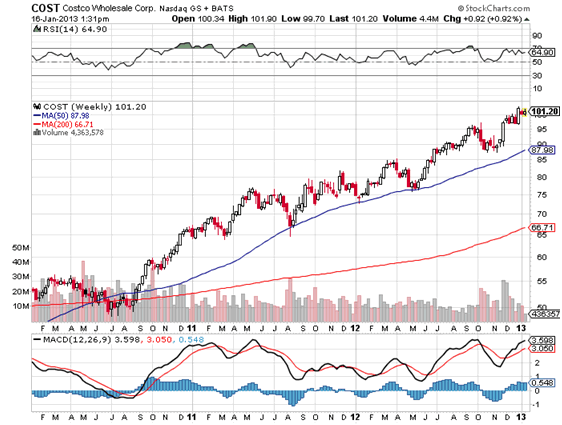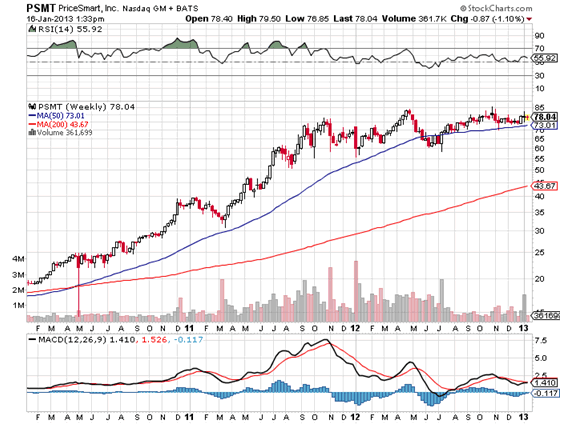Investors, You Need to Stick with the Cheap Retailers
Companies / Sector Analysis Jan 19, 2013 - 09:49 AM GMT George Leong writes: The retail sector continues to show decent growth, which is encouraging given the lack of strong jobs growth. The improvement in the housing market is helping to add some confidence to consumer spending and the retail sector. Retail sales in December grew 0.5%, above the 0.4% estimate made by Briefing.com. On an ex-auto basis, sales grew at 0.3%, which was the same as November, but below the Briefining.com estimate of 0.5%.
George Leong writes: The retail sector continues to show decent growth, which is encouraging given the lack of strong jobs growth. The improvement in the housing market is helping to add some confidence to consumer spending and the retail sector. Retail sales in December grew 0.5%, above the 0.4% estimate made by Briefing.com. On an ex-auto basis, sales grew at 0.3%, which was the same as November, but below the Briefining.com estimate of 0.5%.
Retail sales in December, comprising 22 retailers polled by the Thomson Reuters Same-Store Sales Index, increased a slightly better-than-expected 3.4% versus the estimate of 3.3%. (Source: Wahba, P. and Skariachan, D., “December retail sales up, but discounts hurt profits,” Reuters, January 5, 2012.)
The results in the retail sector are decent but not stellar, as there’s still a hesitancy to spend, at least at non-discounted prices.
lululemon athletica inc. (NASDAQ/LULU) fell nearly four percent on January 10 after the fashionable maker of athletic clothing made a downward revision in its sales guidance.
Discounter Target Corporation (NYSE/TGT) reported flat sales in December, which is a disappointment, given the hope placed on the holiday shopping season, when some retailers can generate up to 40% of total annual sales.
I believe the department stores and some of the specialty retailers will fare well. The key to success in the retail sector is selective picking. I would stay away from J. C. Penney Company, Inc. (NYSE/JCP) as the company tries to restructure out of its mess.
My advice is to continue to stick with the leading discount bellwether retail stocks. In the large-cap retail sector area, the top companies are Wal-Mart Stores, Inc. (NYSE/WMT), Target, and Costco Wholesale Corporation (NASDAQ/COST).
The king of the big-box stores continues to be Costco, which reported a stronger-than-expected nine-percent jump in its key same-store sales reading in December. (Source: “Costco December same-store sales up 9 percent,” Reuters, January 3, 2013.)
Costco’s stock chart below is a wonderful example of consistency and steady price appreciation.

Chart courtesy of www.StockCharts.com
The results continue to show steady growth; but for that extra bit of growth, you should look at the smaller discount companies in the retail sector.
Costco, for instance, has a market cap of $44.0 billion and is estimated by Thomson Financial to report sales growth of 7.4% and 8.5% for the 2013 and 2014 fiscal years, respectively.
By comparison, take a look at mid-cap PriceSmart, Inc. (NASDAQ/PSMT), an operator of warehouse clubs in 12 countries in Central America and the Caribbean.
Consider the comparative sales growth for PriceSmart by Thomson Financial, which is 13.6% and 15.4% for FY13 and FY14, respectively—higher than Costco. The growth estimates are probably conservative and could really take off if the expansion continues.
The chart below shows a plateau and sideways trading. Be careful of the downside risk.

Chart courtesy of www.StockCharts.com
Another interesting discounter is large-cap Dollar General Corporation (NYSE/DG), which operates over 10,000 stores across 40 states. For investors looking at the retail sector, Dollar General has reasonable valuation and above-average long-term price appreciation potential.
And when the housing market and job numbers pick up, I expect spending in the retail sector to continue to increase, especially on non-essential goods and services.
My favorite in the retail sector continues to be the discounters and big-box stores. The big-box stores are now selling a broad range of electronics, and they are adding to their product line, offering consumers a one-stop place for shopping and creating higher revenue flow.
Source: http://www.investmentcontrarians.com/recession/you-need-to-stick-with-the-cheap-retailers/1259/
By George Leong, BA, B. Comm.
www.investmentcontrarians.com
Investment Contrarians is our daily financial e-letter dedicated to helping investors make money by going against the “herd mentality.”
George Leong, B. Comm. is a Senior Editor at Lombardi Financial, and has been involved in analyzing the stock markets for two decades where he employs both fundamental and technical analysis. His overall market timing and trading knowledge is extensive in the areas of small-cap research and option trading. George is the editor of several of Lombardi’s popular financial newsletters, including The China Letter, Special Situations, and Obscene Profits, among others. He has written technical and fundamental columns for numerous stock market news web sites, and he is the author of Quick Wealth Options Strategy and Mastering 7 Proven Options Strategies. Prior to starting with Lombardi Financial, George was employed as a financial analyst with Globe Information Services. See George Leong Article Archives
Copyright © 2013 Investment Contrarians- All Rights Reserved Disclaimer: The above is a matter of opinion provided for general information purposes only and is not intended as investment advice. Information and analysis above are derived from sources and utilising methods believed to be reliable, but we cannot accept responsibility for any losses you may incur as a result of this analysis. Individuals should consult with their personal financial advisors.
Investment Contrarians Archive |
© 2005-2022 http://www.MarketOracle.co.uk - The Market Oracle is a FREE Daily Financial Markets Analysis & Forecasting online publication.



